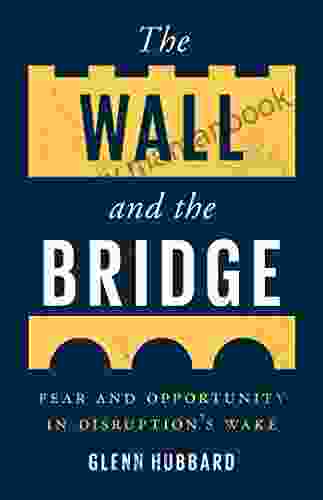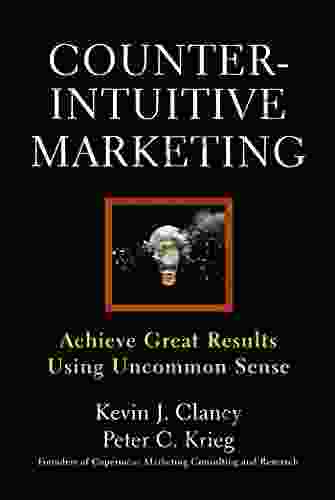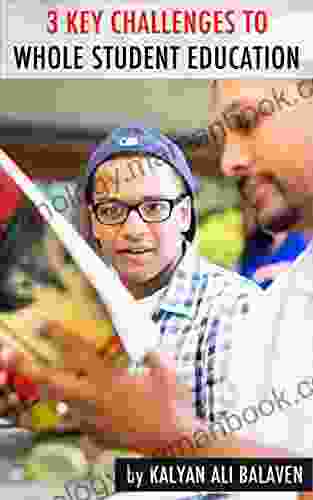Key Challenges to Whole Student Education: A Comprehensive Overview

5 out of 5
| Language | : | English |
| File size | : | 1125 KB |
| Text-to-Speech | : | Enabled |
| Screen Reader | : | Supported |
| Enhanced typesetting | : | Enabled |
| Word Wise | : | Enabled |
| Print length | : | 14 pages |
| Lending | : | Enabled |
Whole student education is an approach that focuses on the holistic development of students, addressing their academic, social, emotional, and physical well-being. This comprehensive approach aims to foster students' success not only in their academic endeavors but also as well-rounded individuals who are equipped to thrive in all aspects of their lives. However, despite its numerous benefits, implementing whole student education poses several challenges that need to be carefully considered and addressed. This article explores the key challenges associated with whole student education and discusses potential strategies to overcome them, contributing to the advancement and success of this educational approach.
Challenges to Whole Student Education
1. Lack of a Comprehensive Definition and Understanding
One of the primary challenges to whole student education lies in the lack of a universally accepted definition and understanding of the concept. This can lead to varying interpretations and inconsistencies in its implementation across different educational settings. Developing a clear and comprehensive definition of whole student education, outlining its core principles and essential components, would provide a solid foundation for its successful implementation.
2. Limited Resources and Funding
Implementing whole student education requires significant resources and funding to provide students with the necessary support and opportunities. This includes funding for specialized programs, additional staffing, professional development for educators, and access to appropriate facilities and equipment. However, many schools and districts face budget constraints that limit their ability to fully embrace this approach. Identifying sustainable funding sources and advocating for increased investment in whole student education are crucial to overcome this challenge.
3. Teacher Training and Support
Educators play a vital role in implementing whole student education, and they need adequate training and support to effectively facilitate this approach. This includes training on evidence-based practices in social-emotional learning, trauma-informed education, and positive behavior interventions and supports. Providing ongoing professional development opportunities and creating a supportive work environment for teachers are essential to ensure their capacity and well-being.
4. Curriculum Design and Assessment
Designing a curriculum that aligns with the principles of whole student education is another challenge. Traditional curricula often focus primarily on academic content, neglecting other essential areas such as social-emotional skills and physical activity. Developing comprehensive curricula that integrate academic, social-emotional, and health components is crucial to foster students' holistic development. Additionally, assessment practices need to be revised to measure students' progress in all these areas, moving beyond standardized testing to incorporate more authentic and holistic assessments.
5. Collaboration and Partnerships
Whole student education requires collaboration and partnerships among multiple stakeholders, including educators, administrators, parents, community members, and healthcare providers. Fostering open communication, establishing clear roles and responsibilities, and building strong relationships are essential for effective collaboration. Creating mechanisms for regular communication, joint planning, and shared decision-making can enhance the collective impact of all stakeholders working towards the common goal of supporting students' whole development.
6. Equitable Access and Inclusion
Ensuring equitable access and inclusion for all students is a fundamental challenge in whole student education. Students from diverse backgrounds, including those with disabilities, English learners, and students from low-income families, may face barriers in accessing the support and resources they need to succeed. Implementing targeted interventions, providing individualized support, and addressing systemic inequities are necessary to create inclusive learning environments where all students have an equal opportunity to thrive.
7. Measurement and Evaluation
Measuring and evaluating the impact of whole student education programs is crucial to demonstrate their effectiveness and inform ongoing improvement efforts. However, developing meaningful and comprehensive evaluation frameworks can be challenging. Identifying appropriate indicators and data collection methods, establishing baselines, and conducting longitudinal studies are important to track students' progress and assess the impact of whole student education initiatives over time.
Overcoming the Challenges
Addressing the challenges to whole student education requires a multifaceted approach that involves collaboration among educators, policymakers, researchers, and community stakeholders. Here are some potential strategies to overcome these challenges:
1. Establish a Clear Definition and Understanding
Develop a comprehensive definition and framework for whole student education, outlining its key principles, essential components, and expected outcomes. Disseminate this definition widely to promote a shared understanding and ensure consistency in implementation across different educational settings.
2. Secure Funding and Resources
Advocate for increased funding and resources to support whole student education programs. Explore innovative funding models, such as public-private partnerships and community-based initiatives. Prioritize funding for specialized programs, additional staffing, professional development, and access to appropriate facilities and equipment.
3. Invest in Teacher Training and Support
Provide comprehensive training and support for educators on the principles and practices of whole student education. Develop targeted professional development programs that focus on social-emotional learning, trauma-informed education, positive behavior interventions and supports, and differentiated instruction. Create a supportive work environment for teachers, ensuring they have the necessary resources and mentorship to effectively implement whole student education approaches.
4. Enhance Curriculum Design and Assessment
Revise curricula to align with the principles of whole student education, incorporating content that promotes academic, social-emotional, and physical development. Integrate social-emotional learning, health education, and physical activity into the curriculum to foster students' holistic well-being. Develop authentic and holistic assessment practices that measure students' progress in all these areas, moving beyond standardized testing to capture their growth and development.
5. Foster Collaboration and Partnerships
Establish strong partnerships among educators, administrators, parents, community members, and healthcare providers. Create mechanisms for regular communication, joint planning, and shared decision-making. Encourage community involvement in schools and provide opportunities for parents and community members to contribute to students' whole development.
6. Promote Equitable Access and Inclusion
Implement targeted interventions to address barriers faced by students from diverse backgrounds. Provide individualized support, such as language support services for English learners and accommodations for students with disabilities. Address systemic inequities through policy changes and resource allocation to create inclusive learning environments where all students have an equal opportunity to succeed.
7. Develop Robust Measurement and Evaluation Systems
Establish comprehensive evaluation frameworks that measure the impact of whole student education programs on students' academic, social-emotional, physical, and mental health outcomes. Identify appropriate indicators and data collection methods, establish baselines, and conduct longitudinal studies to track students' progress and assess the effectiveness of whole student education initiatives over time. Use evaluation findings to inform ongoing improvement efforts and ensure the continuous enhancement of whole student education programs.
Whole student education offers a transformative approach to education, recognizing the importance of students' holistic development. While implementing whole student education presents several challenges, addressing these challenges through collaboration, innovation, and a commitment to equity can unlock its full potential. By establishing a clear definition, securing funding, investing in teacher training, enhancing curriculum and assessment, fostering collaboration, promoting equity, and developing robust measurement and evaluation systems, we can overcome these challenges and create educational environments where all students have the opportunity to thrive academically, socially, emotionally, and physically. Embracing whole student education empowers students to become well-rounded individuals who are equipped to succeed in all aspects of their lives and contribute positively to their communities and the world at large.
5 out of 5
| Language | : | English |
| File size | : | 1125 KB |
| Text-to-Speech | : | Enabled |
| Screen Reader | : | Supported |
| Enhanced typesetting | : | Enabled |
| Word Wise | : | Enabled |
| Print length | : | 14 pages |
| Lending | : | Enabled |
Do you want to contribute by writing guest posts on this blog?
Please contact us and send us a resume of previous articles that you have written.
 Top Book
Top Book Novel
Novel Fiction
Fiction Nonfiction
Nonfiction Literature
Literature Paperback
Paperback Hardcover
Hardcover E-book
E-book Audiobook
Audiobook Bestseller
Bestseller Classic
Classic Mystery
Mystery Thriller
Thriller Romance
Romance Fantasy
Fantasy Science Fiction
Science Fiction Biography
Biography Memoir
Memoir Autobiography
Autobiography Poetry
Poetry Drama
Drama Historical Fiction
Historical Fiction Self-help
Self-help Young Adult
Young Adult Childrens Books
Childrens Books Graphic Novel
Graphic Novel Anthology
Anthology Series
Series Encyclopedia
Encyclopedia Reference
Reference Guidebook
Guidebook Textbook
Textbook Workbook
Workbook Journal
Journal Diary
Diary Manuscript
Manuscript Folio
Folio Pulp Fiction
Pulp Fiction Short Stories
Short Stories Fairy Tales
Fairy Tales Fables
Fables Mythology
Mythology Philosophy
Philosophy Religion
Religion Spirituality
Spirituality Essays
Essays Critique
Critique Commentary
Commentary Glossary
Glossary Bibliography
Bibliography Index
Index Table of Contents
Table of Contents Preface
Preface Introduction
Introduction Foreword
Foreword Afterword
Afterword Appendices
Appendices Annotations
Annotations Footnotes
Footnotes Epilogue
Epilogue Prologue
Prologue Kathy Greeley
Kathy Greeley Kara Allan
Kara Allan Bella Blair
Bella Blair Jolene Brighten
Jolene Brighten A M Van Dorn
A M Van Dorn Melody Rogers
Melody Rogers Cris Yeager
Cris Yeager P J Gerrard Gough
P J Gerrard Gough Roger Maxim
Roger Maxim Ryan Berridge
Ryan Berridge Aja Raden
Aja Raden Alan Seaborn
Alan Seaborn Heikin Ashi Trader
Heikin Ashi Trader Randy Wayne White
Randy Wayne White Linda Greenhouse
Linda Greenhouse Chris Wallace
Chris Wallace Marisa T Mazza Psyd
Marisa T Mazza Psyd James Dillehay
James Dillehay Clare Flynn
Clare Flynn Liz B Taylor
Liz B Taylor
Light bulbAdvertise smarter! Our strategic ad space ensures maximum exposure. Reserve your spot today!

 Craig BlairKimetsu No Yaiba Volume 20: A Literary Masterpiece that Ignites the Flames of...
Craig BlairKimetsu No Yaiba Volume 20: A Literary Masterpiece that Ignites the Flames of...
 David PetersonNavigating the Crossroads of Disruption: Fear and Opportunity in the Digital...
David PetersonNavigating the Crossroads of Disruption: Fear and Opportunity in the Digital... Orson Scott CardFollow ·5.3k
Orson Scott CardFollow ·5.3k Henry HayesFollow ·8.5k
Henry HayesFollow ·8.5k Ethan MitchellFollow ·11k
Ethan MitchellFollow ·11k Jim CoxFollow ·10.9k
Jim CoxFollow ·10.9k Gil TurnerFollow ·16.9k
Gil TurnerFollow ·16.9k Arthur Conan DoyleFollow ·7.3k
Arthur Conan DoyleFollow ·7.3k Guillermo BlairFollow ·12.8k
Guillermo BlairFollow ·12.8k Jared NelsonFollow ·12.4k
Jared NelsonFollow ·12.4k

 Christopher Woods
Christopher WoodsDeath's Second Chance: The Unbelievable Story of Cris...
On July 29, 2008, Cris...

 Esteban Cox
Esteban CoxFrom Ralphie Kids to Adolescents: The Journey to Manhood
The transition from...

 Chris Coleman
Chris ColemanLetters From Young Father Poems: Delving into the Heart...
Fatherhood, a journey filled...

 Holden Bell
Holden BellCounterintuitive Marketing: Achieving Great Results Using...
In the ever-evolving world of...
5 out of 5
| Language | : | English |
| File size | : | 1125 KB |
| Text-to-Speech | : | Enabled |
| Screen Reader | : | Supported |
| Enhanced typesetting | : | Enabled |
| Word Wise | : | Enabled |
| Print length | : | 14 pages |
| Lending | : | Enabled |












